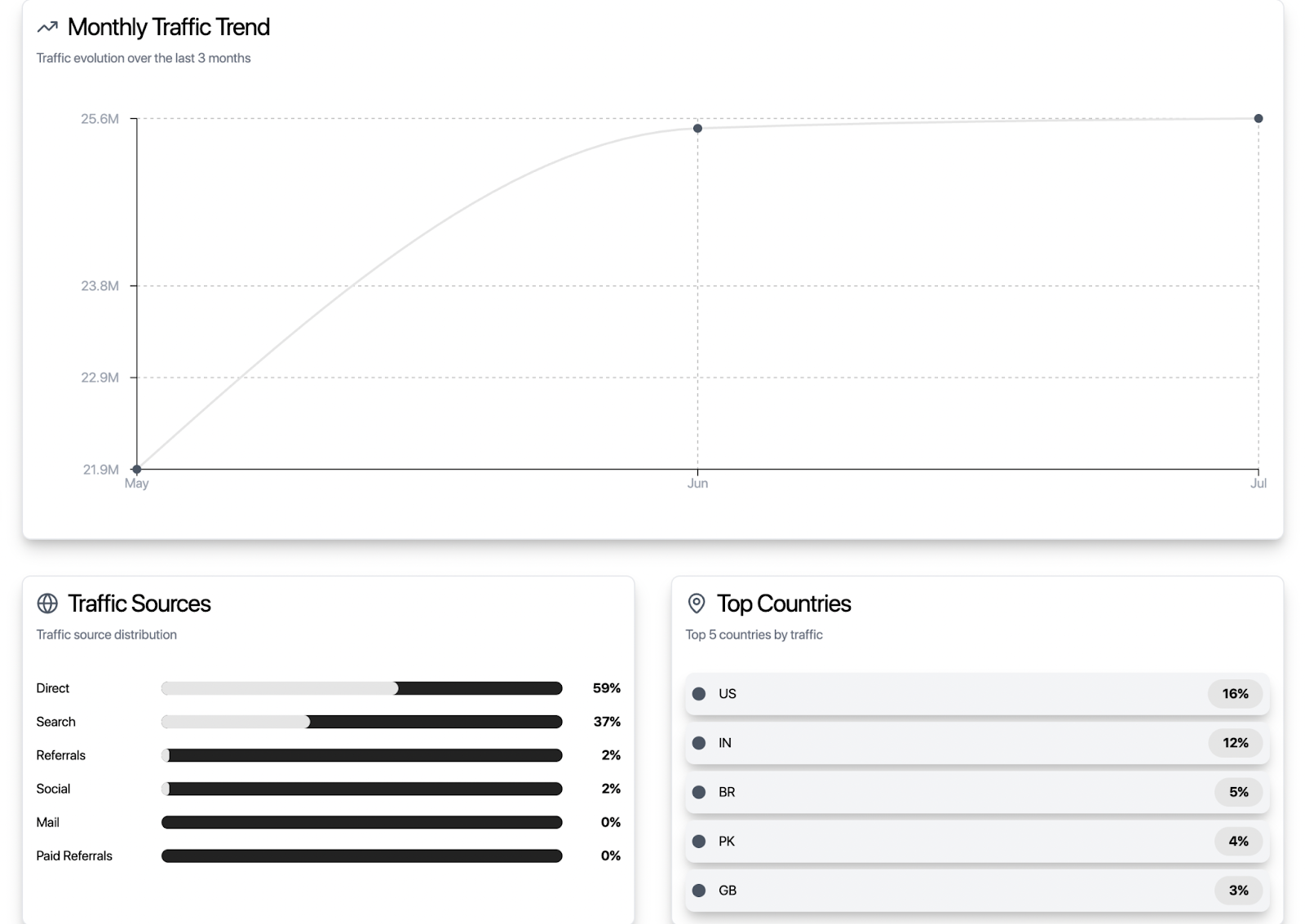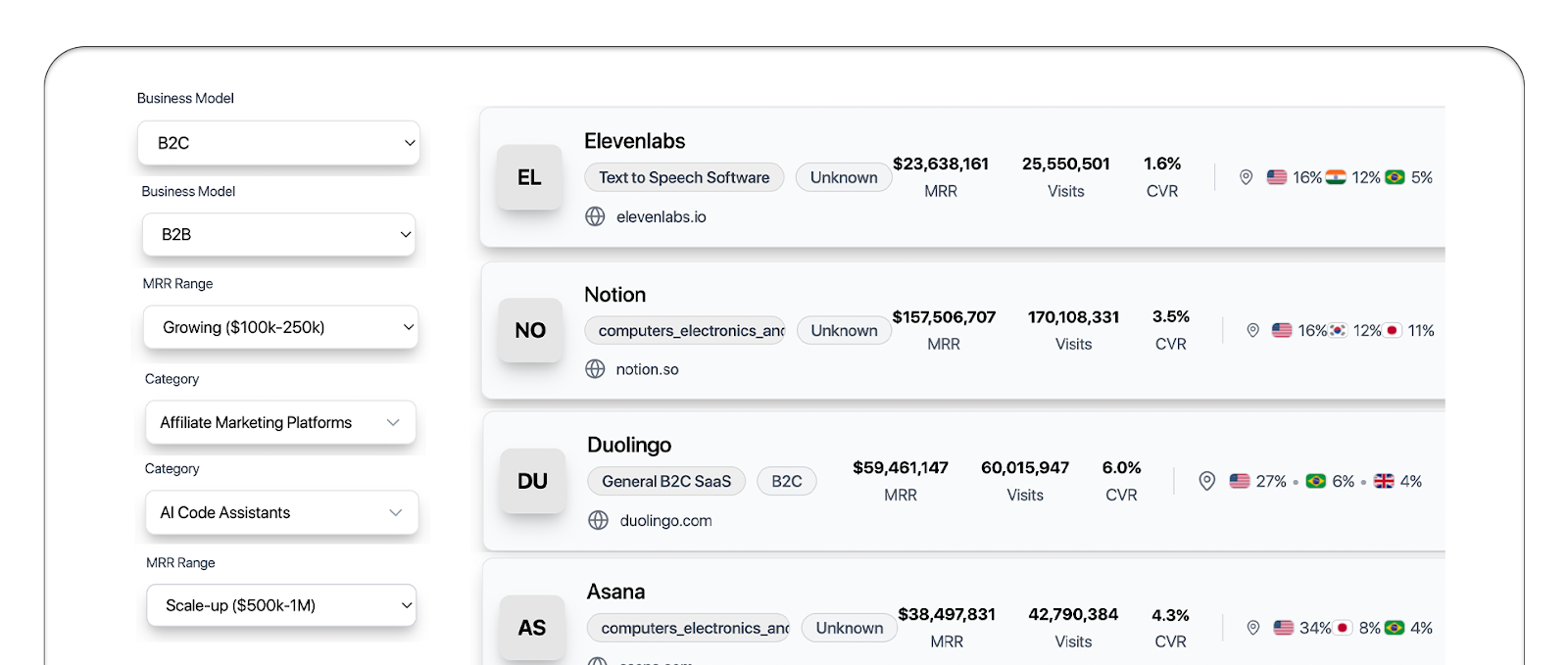


Crunchbase Alternatives: Top Tools for 2025
The SaaS landscape in 2025 is a crucible of innovation, constantly reshaped by emerging technologies, most notably the pervasive influence of artificial intelligence. For startup founders, product builders, and ambitious indie hackers, simply having a great idea is no longer enough. Success hinges on a profound, almost intuitive, understanding of the market's pulse: identifying burgeoning trends, dissecting competitor growth trajectories, validating product ideas with precision, and seizing fleeting opportunities before they saturate. This dynamic environment demands a proactive and deeply data-driven approach to market research and competitive intelligence.
Traditional web analytics platforms like Similarweb provide a high-level panoramic view of internet traffic and audience demographics. While invaluable for established enterprises conducting broad market analysis, they often lack the granular, real-time SaaS-specific metrics and the targeted exploration capabilities crucial for nimble, early-stage ventures. In an era where precision and speed can dictate a startup's trajectory, founders require a sharper, more focused lens on market research and competitive tracking. This guide explores a diverse range of platforms offering dashboard-based insights, revealing core growth metrics, and facilitating intuitive category Browse, all designed to arm founders with the intelligence needed to build and scale successfully in the fiercely competitive SaaS landscape of 2025.
The Evolving Imperative: Why Traditional Approaches Are Insufficient
The conventional toolkit for market analysis, while comprehensive in its scope, increasingly struggles to keep pace with the hyper-accelerated realities of a modern startup. A large volume of website traffic, for instance, offers only a superficial glimpse into the true health and underlying economics of a SaaS business. Founders grappling with the elusive challenge of achieving genuine product-market fit or endeavoring to carve out profitable niches require a fundamentally different caliber of data. They need insights that directly address recurring revenue streams, customer retention rates, and the nuanced, often exponential, growth patterns characteristic of a subscription-based model.
A founder's critical questions delve deeper than just traffic. Is that traffic converting into genuinely paying customers? Are those customers remaining loyal over time, indicating a sticky product and robust value? Is the product genuinely resonating within its highly specific vertical, signaling true product-market fit? Answering these necessitates a profound shift from static, domain-specific search queries to dynamic, exploratory data analysis. The focus must squarely be on actionable intelligence that directly informs product strategy, optimizes marketing spend, and identifies potential avenues for strategic pivots, all without overwhelming founders with irrelevant data.
Furthermore, a significant limitation of many general-purpose market analysis tools is their inherent bias towards larger, more established, and often publicly known entities. This leaves a substantial blind spot for the burgeoning and rapidly evolving landscape of early-stage SaaS and AI startups. It is precisely within these nascent, often overlooked spaces that the most disruptive opportunities frequently lie. Uncovering these hidden gems, however, demands a specialized approach to discovery. The contemporary founder requires tools that facilitate rapid discovery, enable rigorous product validation, and allow for precise competitive assessment, extending far beyond mere retrospective analysis. This calls for a diversified suite of tools, each excelling in a particular facet of market understanding, collectively empowering founders to make informed decisions at the speed of the market.
Navigating the Competitive Currents: Specialized Tools for Every Founder's Arsenal
In the intricate and fast-moving world of startup growth, founders require highly specific insights that generalized analytics tools often cannot deliver. The platforms detailed below each offer distinct yet complementary approaches to understanding the market, meticulously tracking competitors, and rigorously validating product ideas. Each tool plays a crucial role in different facets of a comprehensive competitive intelligence strategy.
Zeltadata: The Dashboard-First Approach to SaaS Performance
For founders deeply immersed in the B2B software and AI innovation sectors, gaining a clear, concise, and immediate picture of the market is paramount. Zeltadata shifts the paradigm from exhaustive web traffic reports to immediate, dashboard-centric insights into the actual, core performance of SaaS and AI SaaS companies. Unlike tools that primarily focus on digital traffic or broad funding announcements like Similarweb or Crunchbase, Zeltadata prioritizes the underlying business mechanics.
Users can browse and filter entire categories, such as "Fintech AI SaaS" or "Developer Tool SaaS," to identify key players and their performance at a glance. This accelerated discovery dramatically reduces manual research, directing focus to building and iterating with data-backed conviction. The platform concentrates on the most impactful metrics for recurring revenue businesses: Monthly Recurring Revenue (MRR), Annual Recurring Revenue (ARR), and Churn. These indicators provide a real-time pulse on a SaaS company’s financial health, growth momentum, and customer retention. Zeltadata's design aims to facilitate rapid strategic decision-making, allowing founders to dedicate more time to building and iterating based on concrete market signals. It offers a faster, dashboard-based alternative focused on exploration, not just static search.

PitchBook: Comprehensive Private Market Data
PitchBook is widely regarded as one of the most comprehensive platforms for private market data, offering in-depth insights into venture capital, private equity, and M&A activities. It provides detailed profiles on companies, investors, funds, and deals, often with more granular information than Crunchbase.
For founders, PitchBook is invaluable for competitive analysis, allowing you to track funding rounds of competitors, analyze investment trends by sector or stage, and research potential investors with remarkable detail. Its data extends to company valuations, cap tables, and key employee movements, offering a truly holistic view of the private market. While its pricing can be a barrier for very early-stage startups, the depth and accuracy of its data make it a go-to for serious fundraising, strategic partnerships, and in-depth market mapping.
Dealroom: European Tech Ecosystem Focus
Dealroom stands out for its strong focus on the European tech ecosystem, providing deep insights into startups, scale-ups, and investment trends across the continent. It tracks funding rounds, valuations, and talent metrics, often with a more granular view of regional activity than global databases.
For founders targeting European markets or seeking to understand the dynamics within specific European tech hubs, Dealroom is an essential resource. It's used by governments, accelerators, and corporates for ecosystem heat-maps and benchmarks. It allows users to monitor investment opportunities, track M&A leads, and delve into new technologies emerging from European hubs. While it may have less extensive coverage for US or Asian markets in its lower tiers, its European depth is unparalleled.
CB Insights: Market Intelligence with AI-Powered Analysis
CB Insights is a market intelligence platform known for its massive database and advanced analytical capabilities, particularly its use of AI to uncover technology insights and emerging trends. It goes beyond raw data to provide predictive analysis and pattern recognition.
For founders, CB Insights is powerful for identifying disruptive technologies, understanding shifts in venture funding, and spotting competitive threats or opportunities. It provides detailed reports, industry landscapes, and trend analysis that can inform strategic planning and product development. Its focus on "Emerging Spaces" and AI-driven insights helps founders discover new and burgeoning market segments before they become widely known.
OpenVC: Democratizing Investor Access
OpenVC is an innovative platform designed to democratize access to venture capital for tech founders. It offers a community-edited database of investors, providing transparency into their investment thesis, recent investments, and direct contact methods.
The platform streamlines the fundraising process by allowing founders to submit their pitch decks directly via a standardized form, often bypassing the need for cold emails. It includes features for investor matching, a resource library, and a deal tracker. OpenVC is particularly valuable for early-stage founders seeking to connect with angels and VCs without intermediaries, offering a free tier that makes investor outreach more accessible. Its community-driven data can also provide fresh, real-time insights into active investors.
Foundersuite: Fundraising CRM and Investor Database
Foundersuite combines an investor CRM with a curated database of investors, making it a powerful tool for managing the entire fundraising process. It's designed to help founders organize their investor outreach, track communications, and manage their pipeline.
Its features include Kanban-style pipeline boards for tracking introductions, meetings, and commitments, alongside email tools and customizable templates for investor updates. The database includes thousands of investors, often tagged by investment focus. Foundersuite helps streamline the often chaotic process of raising capital, ensuring no lead falls through the cracks and communications are consistent. It also offers limited data room functionality for document sharing.
Visible.vc: Investor Relations and Reporting Focused
Visible.vc began as an investor update platform and has evolved to offer a comprehensive suite for investor relations, including an investor database, portfolio KPI dashboards, and data rooms. It's ideal for founders who are actively managing investor communications and reporting.
Founders can use Visible.vc to create professional monthly or quarterly investor updates, track key performance indicators (KPIs) like revenue and churn, and securely share documents with investors. It simplifies the reporting process, ensuring transparency and efficiency. While its investor list might be smaller than some larger databases, its strength lies in helping founders maintain strong relationships with their existing and prospective investors through structured, consistent communication.
Growjo: Free Startup Tracking and Growth Metrics
Growjo offers a free database that allows users to view, sort, and export key data points about startups, focusing on growth metrics like headcount growth rate and estimated revenue. It aims to provide insights into company momentum that might not be immediately obvious from just funding data.
For founders looking for a cost-effective way to track competitors or identify fast-growing companies, Growjo can be quite useful. Its simple interface allows for quick searches and data exports, making it accessible for basic competitive analysis. While it might not offer the deep financial analysis of paid platforms, its free access to growth-oriented data makes it a valuable alternative for early-stage market monitoring.
Exploding Topics: Identifying Future Trends
Exploding Topics is a unique tool specifically designed to help founders spot emerging trends before they go mainstream. It leverages AI and a team of analysts to identify rapidly growing topics, products, and industries, offering a significant advantage for early market entry.
Instead of looking at historical data, Exploding Topics focuses on identifying nascent interest signals across various online channels, from search queries to niche communities. This allows founders to validate new product ideas against real-time, forward-looking market interest. By understanding what's about to become popular, founders can proactively develop solutions for future demand, rather than reactively competing in saturated markets. This tool is invaluable for strategic planning, product innovation, and identifying genuinely novel opportunities in the fast-paced SaaS and AI landscape.
Harmonic.ai: AI-Powered Startup Database for VCs and Founders
Harmonic.ai is an AI-powered database primarily designed for venture capitalists to source promising startups, but it also provides significant value for founders. It aims to uncover early-stage companies from a variety of data sources, often well before other providers.
This platform allows users to create highly specific searches, identify new and promising companies, and effortlessly find "the needle in the haystack" of the startup world. Its AI agent helps VCs scout for investment opportunities, which founders can reverse-engineer to understand investor interest. For founders, Harmonic.ai can offer insights into the types of companies investors are actively looking at, helping to refine their pitch and target the right kind of capital. It's about investing or being discovered while others are still doing basic searches.
Building a Comprehensive Intelligence Stack for 2025
The era of making significant strategic decisions based on gut feeling or limited, generalized market reports is rapidly fading. For startup founders in 2025, the path to product-market fit and sustainable, exponential growth is increasingly illuminated by precise, actionable intelligence. The ability to ask and quickly answer critical questions about the market is no longer a luxury but a fundamental necessity for survival and scale.
Integrated Market Mapping
A fragmented view of the market is a dangerous one. By integrating insights from a combination of these Crunchbase alternatives, founders can build a comprehensive market map. This includes not just who got funded and by whom, but why they got funded, what signals they exhibited, and how their growth trends compare to others in the ecosystem. This holistic view enables more intelligent pivots and strategic partnerships.
Proactive Investor Targeting
Leveraging tools specifically designed for investor discovery and CRM transforms fundraising from a scattershot approach into a highly targeted campaign. Founders can identify investors with a proven track record in their specific niche, understand their investment thesis, and even find warm introduction paths. This precision in investor targeting saves immense time and increases the likelihood of securing capital.
Continuous Competitive Foresight
The market doesn't stand still. New startups emerge daily, funding rounds close, and growth trajectories change. A founder's intelligence stack needs to support continuous monitoring. By combining general company databases with specialized tools for trend spotting, social listening, and direct SaaS metric tracking, founders can maintain a constant pulse on their competitive landscape, enabling rapid strategic adjustments.
Data-Driven Product-Market Fit Validation
Ultimately, all this intelligence loops back to building a better product. By understanding what users love and hate about existing solutions (via review platforms), how users interact with similar products (through digital analytics), and what drives recurring revenue (via SaaS metrics), founders can design products that truly solve market problems. This iterative process, fueled by diverse data sources, significantly increases the probability of launching a product that not only finds its market but also thrives within it.

The Future of Growth: Intelligent Insights for Startup Builders
The founders who truly thrive and define the market in 2025 will be those who master the art of competitive intelligence in its broadest sense. They will understand how to judiciously utilize a suite of tools that allow them to filter startup tools by category, accurately track AI tool growth with specific, verifiable metrics, and continually monitor software startup benchmarks against a backdrop of constantly changing market dynamics. This deep, ongoing engagement with comprehensive market data transforms the daunting challenge of launching and scaling a startup into a strategic game, played with clarity, confidence, and a decisive edge. In this intensely dynamic landscape, success is built not just on innovation, but on intelligent, timely insights into the very pulse and future direction of the market. This integrated approach to competitive intelligence is quickly becoming the non-negotiable foundation for any ambitious software venture.

.webp)